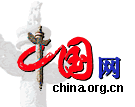| lì
li: |
míng tiān shì zhōng
guó de chuán tŏng jié rì duān wǔ jié, dào wŏ jiā lái chī zòng zì hăo ma? |
| 丽丽: |
明天是中国的传统节日端午节,到我家来吃粽子好吗? |
| Lili:
|
Tomorrow is a traditional
Chinese festival, the Dragon Boat Festival. Would you
like to go to my home to eat some zongzi (glutinous
rice dumplings)? |
| |
|
| mài kè: |
hăo de, xiè xiè!
nĭ mèn duān wǔ jié
fàng jià ma? |
| 麦克: |
好的,谢谢!你们端午节放假吗? |
| Mike: |
Great, thank you! Do
you have a holiday on the Dragon Boat Festival? |
| |
|
| lì
li: |
bú fàng. wŏ mèn
zài chūn jié, láo dòng jié hé guó qìng jiè de shí hòu
fàng jià. |
| 丽丽: |
不放。我们在春节、劳动节和国庆节的时候放假。 |
| Lili:
|
No. We have holidays
at Spring Festival, International Labor Day and National
Day. |
| |
|
| mài kè: |
jià qī cháng ma? yŏu
jĭ tiān? |
| 麦克: |
假期长吗?有几天? |
| Mike: |
Are the holidays long?
How many days? |
| |
|
| lì
li: |
yŏu qī tiān. jīn
nián chūn jié de shí hòu, wŏ mèn quán jiā qù nán
fāng lǚ yóu le. |
| 丽丽: |
有7天。今年春节的时候,我们全家去南方旅游了。 |
| Lili:
|
Seven days for each
of the three festivals. My family traveled to south China
during this year’s Spring Festival. |
| |
|
| mài kè: |
chūn jié shì zhōng guó
zuì dà de jié rì, shì ma?
|
| 麦克: |
春节是中国最大的节日,是吗? |
| Mike: |
Spring Festival is the
biggest festival in China, isn’t it? |
| |
|
| lì
li: |
shì de. tā hé nĭ
mèn de shèng dàn jié yī yàng rè nào.
|
| 丽丽: |
是的。它和你们的圣诞节一样热闹。 |
| Lili:
|
Yes, it is. It’s as
lively as Christmas Day in your country. |
| |
|
| mài kè: |
zhōng guó hái yŏu
nă xiē chuán tŏng jié rì? |
| 麦克: |
中国还有哪些传统节日? |
| Mike: |
What other traditional
festivals does China have? |
| |
|
| lì
li: |
hái yŏu yuán xiāo
jié, zhōng qiū jié, qīng míng jié, dĕng dĕng. |
| 丽丽: |
还有元宵节,中秋节,清明节,等等。 |
| Lili:
|
There are Lantern Festival,
Mid-Autumn Festival, Qingming Festival and so on. |
| |
|
| mài kè: |
jié rì lĭ yŏu
shén me tè bié de shí pĭn ma? |
| 麦克: |
节日里有什么特别的食品吗?
|
| Mike: |
What special foods do
you have at the festivals? |
| |
|
| lì
li: |
yŏu, bĭ rú
jiăo zì, yuán xiāo hé yuè bĭng. |
| 丽丽: |
有,比如饺子、元宵和月饼。 |
| Lili:
|
We have, for example,
jiaozi, yuanxiao and yuebing. |
| |
|

